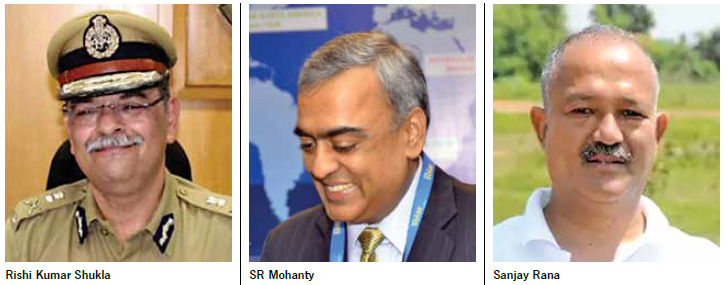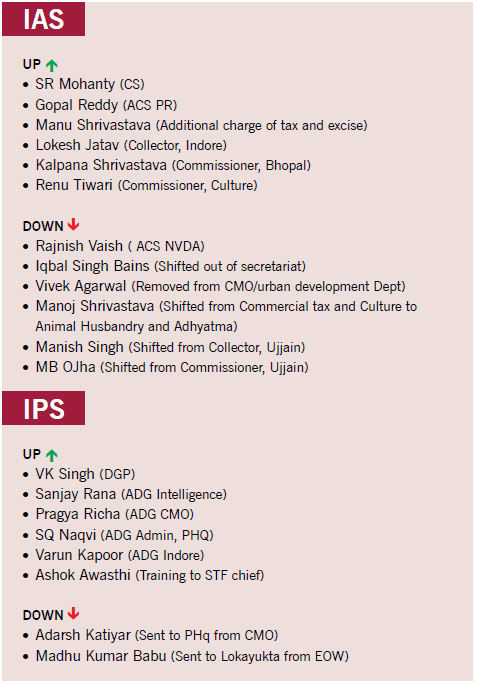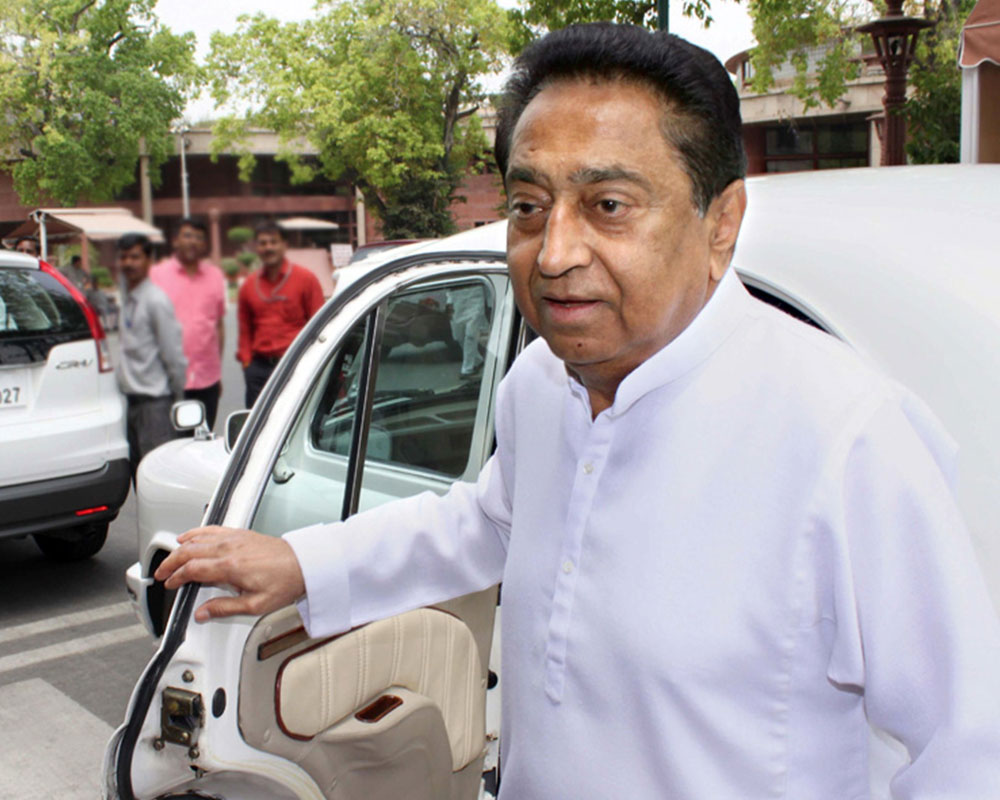BUREAUCRACY is like a horse and to control it, the horseman needs to use his skills (and whip) very well—an old saying in India goes something like this to describe the working relationship between the lawmakers and the civil servants. In other words, it means that if bureaucrats are left to their own, the political master may not be able to get the desired results from them in the “wider interest of people.”
During Shivraj Singh Chouhan’s 15 years rule in the heartland state of Madhya Pradesh, the rider was rather weak and the ‘horse’ (bureaucracy) had the field wide open for grazing. There was almost no control of the Chief Minister on majority of bureaucrats from top to the lower rung and BJP paid its price. Corruption was rampant in MP and every now and then a patwari, or an SDO, or tehsildar, would be caught red-handed by anti-graft agencies. MP also got its share of huge ignominy when Arvind Joshi-Tinoo Joshi, the IAS couple, were caught red-handed by IT authorities with huge cash in 2010 and ultimately thrown out of the service. This happens rarely with the elite IAS, but under Shiv ‘Raj’ this was witnessed by the largely backward state.

New Chief Minister Kamal Nath, 73, is, however, a past master in the art of dealing with bureaucrats. Although he is a first time Chief Minister of a state of which, as his political opponents say, he has little knowledge of, his deft handling of various issues has come in for all round praise. He has always been a central player who confined himself to Chhindwara, and to some extent the Mahakoshal region’s few districts. He won from his constituency for a record nine times with just one loss. A seasoned politician and administrator that he is, having been a Union minister for over two decades, Nath is cautiously treading the path as far as bureaucracy is concerned. He has shown a degree of maturity while replacing Shivraj’s men soon after he was sworn in as CM on December 17, 2018.
HE did not summarily remove Chief Secretary (CS) BP Singh (1984), who was already on extension up to December 31, 2018. Any other CM would have removed the head of bureaucracy and brought in his own CS. Problem with Nath was that he did not have an officer of his own choice, so he went purely by Digvijaya Singh’s advice and anointed an otherwise capable officer SR Mohanty (1982), who had been overlooked by Shivraj when his turn came after superannuation of Anthony D’sa (1980) in late 2016. Nor did Nath replace principal secretary to CM. In a kind of first, Ashok Barnwal (1991), who was PS under Shivraj, continued in the same post by the new CM. Barnwal, a low-profile honest officer, had earlier worked in Delhi with Kamal Nath as his personal secretary and the chemistry between them is said to be excellent. But Nath, expectedly, was not kind enough with other officers close to earlier regime. In the first list of transfers, he removed Vivek Agarwal, Hariranjan Rao and Manoj Shrivastava, among others.
Although Kamal Nath is a first time Chief Minister of a state of which, as his political opponents say, he has little knowledge of, his deft handling of various issues has come in for all round praise
Highly places sources said that Radheshyam Julania (1985) was a top contender for the CS post and had several meetings with Nath to stake claim for the top job. But Digvijaya prevailed over to get the post for Mohanty, embroiled in a multi-crore industrial scam of Congress raj of 1998-2003 (the second term of Digvijaya). The investigation into what is known as the ICD scam is still being done by the state’s economic offences wing (EOW) and a CAT order of December 2018 was also against Mohanty. Yet he was picked up to lead the state’s officialdom.

Political grapevine says that since Singh had supported Nath in front of Rahul Gandhi for the Chief Minister’s post many months ago, Nath returned the favour by making Singh’s staunch follower Mohanty the CS. For public consumption, it is said that the Nath government has followed the principle of seniority. Mohanty is the senior-most officer in MP. He may remain CS for two years. Many officers are of the opinion that Mohanty had enough of a ‘punishment’ for a crime which was yet to be proved, although an appeal is pending in the Supreme Court. A crestfallen Julania, well-known for his brashness, is now heading to Centre because he could not get along well with the new CS, three years senior to him. Julania is already empanelled as Secretary in the Government of India.
In a kind of first, Ashok Barnwal (1991), who was PS under Shivraj, continued in the same post by the new CM. Barnwal, a low-profile honest officer, had earlier worked in Delhi with Kamal Nath as his personal secretary and the chemistry between them is said to be excellent
Nath’s second choice for immediate removal would have been the DGP. But here too, he has shown political maturity and has not acted against Rishi Kumar Shukla, a 1983 batch accomplished officer who is known for his unmatched integrity and professional skills. He shifted the DGP late in January and replaced him with a low profile VK Singh, the most senior of 1984 batch in MP. Unlike, Mohanty, Shukla was known to be a ‘non-aligned officer’ who kept a safe distance from political parties, which a bureaucrat is expected to (normally) do. Even under Chouhan, he had managed to remain upright and did not move very close to the CM or the BJP. Shukla has now been made Police Housing Corporation chief.

BUT Nath was swift to change two important senior police officers—ADG (Intelligence) and ADG in CM office. For the first time a woman police officer, Pragya Richa, has been posted in the CM office replacing Adarsh Katiyar. Rajiv Tandon, ADG (Intelligence) was replaced by Sanjay Rana, who was said to have been in a loop line. The other top cop in Bhopal, Madhubabu, who was head of EOW, was shifted and KN Tiwari was brought in as ADG.
EOW is the body which is probing many sensitive cases of top officials, including the ICD scam. While a number of collectors and SPs were changed and continued to be changed in instalments well after a month of Nath’s taking over, the Chhindwara connection of officers is being talked about in the bureaucracy and media, especially about the IAS officials. First one to go were the SP and Collector of Chhindwara, being BJP appointees.

Those who have not been touched despite being on sensitive or important posts include, Malay Shrivastav (Principal Secretary Home), P Narhari (Commissioner PR) and Manu Shrivastava, who has been given an additional charge of important revenue collection department of Commercial Taxes and Excise. MP is badly in need of financial resources as BJP had emptied the state exchequer and required a tough and clean officer to enhance the revenue inflow. M Gopal Reddy (1985) has been brought to Bhopal as the ACS (Public Relations) from Gwalior’s revenue board. All of them, incidentally, have served at some point of time in Chhindwara and most of them, if not all, enjoy reputation of being professionally sound civil servants with relatively clean image. The non-Chhindwara connection officer to have survived is Rajesh Rajora, PS Agriculture, the one who issued the first order of this government for farm loan waiver, as was promised by Congress in its manifesto. That the farm loan waiving exercise is being criticised by opponents for faulty implementation, is a different story altogether.

THE man for all seasons, however, remains Md Suleman, Principal Secretary, Commerce and Industry. The 1989 batch IAS officer, who headed infrastructure departments under Shivraj, continues to hold PWD and C&I departments even as Nath has expressed reservations in public about the Industrial Investment Summits held every second year with lot of pomp and show. Suleman, a competent officer, was District Collector of Indore when Digvijaya was the CM. He had also served in the same capacity at Balaghat where he is said to have first come in contact with Nath. Later, as MD of the MP Roads Development Corporation, he had impressed Nath, then Union minister for Road Transport. Suleman is an urbane and suave officer who enjoys tremendous clout under any regime. Along with CS Mohanty, he also accompanied Nath to Davos in January for the World Economic Forum.
The man for all seasons, however, remains Md Suleman, Principal Secretary, Commerce and Industry. The 1989 batch IAS officer, who headed infrastructure departments under Shivraj, continues to hold PWD and C&I departments even as Nath has expressed reservations in public about the Industrial Investment Summits held every second year with lot of pomp and show
Former chief secretary Anthony D’sa, a spotless officer of 1980 batch, has emerged as principal advisor of the Nath regime, unofficially though. Shivraj had made him the CS, but is considered close to Nath. Their relationship goes back to Nath’s stint in the environment ministry in the early 90s. He is the chairman of RERA now.












































